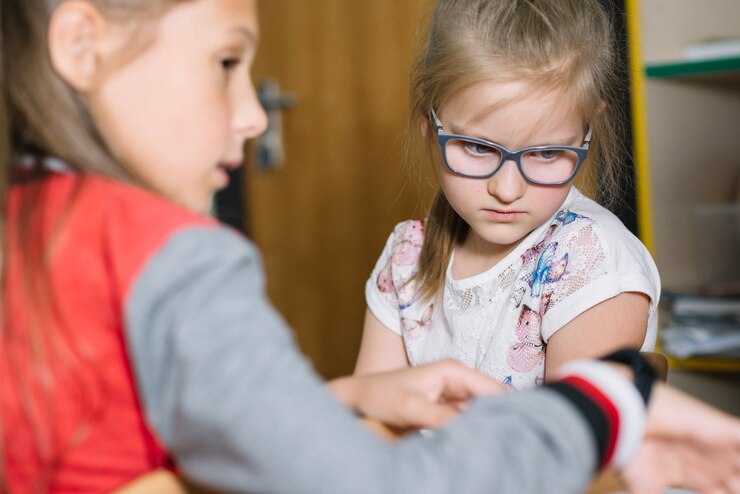Understanding Anger in Children: A Must-Read Guide for Parents
 As parents, we all want our children to grow up to be happy, well-adjusted individuals. However, dealing with anger in children can be a challenging task. Understanding the root causes of anger and learning effective strategies to address it is crucial for both their well-being and our sanity.
As parents, we all want our children to grow up to be happy, well-adjusted individuals. However, dealing with anger in children can be a challenging task. Understanding the root causes of anger and learning effective strategies to address it is crucial for both their well-being and our sanity.
In this comprehensive guide, we delve into the intricate world of childhood anger, offering valuable insights and practical advice for parents. We explore the underlying factors that contribute to anger in children, such as developmental stages, emotional triggers, and environmental influences. Combining expert research and real-life experiences, we provide you with a deeper understanding of your child’s anger and equip you with effective tools to manage and diffuse it.
From communication techniques to setting boundaries, we cover a range of strategies to help you navigate through the stormy waters of childhood anger. Our aim is to empower you as a parent and foster a harmonious family dynamic where children can express their emotions in healthy ways.
Gain invaluable insights and discover the keys to unlocking a calm and happy home. Don’t let anger rule your child’s life – read on to find out how you can make a positive difference.
Why Understanding Anger in Children is Important
Understanding anger in children is important for several reasons. Firstly, it allows us to recognize that anger is a normal emotion and a part of the human experience. By understanding the root causes of anger, we can help our children develop healthy coping mechanisms and problem-solving skills. Additionally, understanding anger in children helps us create a safe and supportive environment where they feel comfortable expressing their emotions.
 Common Triggers for Anger in Children
Common Triggers for Anger in Children
Anger in children can be triggered by various factors. One common trigger is frustration, especially when they are unable to communicate their needs or desires effectively. Other triggers may include fatigue, hunger, or feeling overwhelmed by a particular situation. It is essential to identify these triggers to help prevent and manage anger outbursts effectively.
Signs and Symptoms of Anger in Children
Children express anger in different ways, and it is crucial for parents to recognize the signs and symptoms. Some children may become physically aggressive, while others may withdraw or become irritable. Tantrums, yelling, and slamming doors are also common signs of anger in children. By being aware of these signs, parents can intervene early and help their children navigate their emotions.
The Impact of Anger on Children’s Development
Unmanaged anger can have a significant impact on a child’s development. It can affect their emotional well-being, social relationships, and academic performance. Children who struggle with anger may have difficulty regulating their emotions, which can lead to behavioral problems and difficulty forming healthy relationships. It is therefore crucial to address and manage anger in children to support their overall development.
Strategies for Managing and Coping with Anger in Children
There are several strategies parents can employ to manage and cope with anger in children. Firstly, it is important to model healthy behaviors by managing our own anger effectively. Creating a calm and structured environment, setting clear boundaries, and providing consistent discipline can also help prevent anger outbursts. Moreover, teaching children problem-solving skills, relaxation techniques, and effective communication can empower them to manage their anger in a healthy manner.
Teaching Children Healthy Ways to Express and Manage Anger
It is important to teach children healthy ways to express and manage their anger. Encouraging open communication, active listening, and empathy can help children express their emotions effectively. Additionally, teaching them relaxation techniques such as deep breathing or engaging in physical activities can provide them with alternative outlets for their anger. By equipping children with these skills, we empower them to handle anger in a constructive manner.
Seeking Professional Help for Anger Issues in Children
In some cases, anger issues in children may require professional help. If anger outbursts are persistent, intense, or interfering with daily functioning, seeking the assistance of a mental health professional can be beneficial. A qualified therapist can work with both the child and the parent to identify underlying issues and develop appropriate strategies for managing anger.
 Parenting Tips for Dealing with Anger in Children
Parenting Tips for Dealing with Anger in Children
Dealing with anger in children can be challenging, but there are several parenting tips that can help navigate this journey. Firstly, it is important to remain calm and composed when your child is angry. Offering reassurance, validating their emotions, and providing a safe space for them to express themselves can help diffuse the situation. Additionally, setting clear expectations, establishing routines, and practicing self-care as a parent can contribute to a more harmonious family dynamic.
Conclusion: Empowering Parents to Support Their Children’s Emotional Well-being
Understanding anger in children is a crucial aspect of parenting. By gaining insights into the root causes of anger and implementing effective strategies, parents can help their children develop healthy coping mechanisms and emotional regulation skills. By fostering a supportive and nurturing environment, parents can empower their children to express and manage their anger in healthy ways. Remember, anger is a normal emotion, and with the right tools and guidance, we can guide our children towards emotional well-being and a harmonious family life.
Gain invaluable insights and discover the keys to unlocking a calm and happy home. Don’t let anger rule your child’s life – read on to find out how you can make a positive difference.
Learn more on our YouTube channel.
#understandingangerinchildren #childpsychology #emotioncontrol #angermanagement




